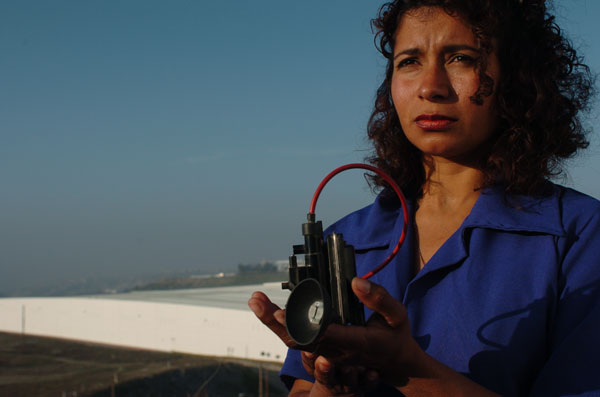Maquilapolis
City of Factories
Women from all over Mexico flock north to the city of Tijuana to find work in the maquiladoras, or factories, along the Mexico-United States border. They come for the promise of a steady income and a better future. More often, what they find is a toxic workplace and a life of desperate poverty. Women are recruited by the maquiladoras to staff the assembly lines because they are thought to be cheap, docile labor, but the women featured in the documentary film Maquilapolis (City of Factories) are proving just the opposite.
Filmmakers Vicky Funari and Sergio De La Torre armed a group of workers with video cameras so they could document themselves. Not simply the subject of the film, the women were involved in every aspect of production. In an interview with the directors conducted by P.O.V. Documentary Films, we learn what power means when women take control of the lens and their livelihoods.
"Maquilapolis tells the story of the human costs of globalization; specifically, it focuses on factory workers in Tijuana. Tijuana is home to hundreds of maquiladoras, which are the multinational-owned factories that are all along the U.S.-Mexico border. We worked with a group of factory workers, taught them to use cameras and worked together for five years developing stories about what they were going through as factory workers. They faced things like human rights abuses, danger from toxic chemicals -- both in the factory and in the environments all around the factories - and complete lack of infrastructure in the neighborhoods where they lived. This particular group of women that we worked with were all involved in trying to improve their situation. They are what are calledpromotoras, or community advocates. This film followed the stories of the work that they were doing to improve their lives."
Sergio De La Torre:
"The film brings together filmmakers, factory workers and activists from both sides of the U.S.-Mexico border. It's actually more than just a film, it's a project that involves working with factory workers directly in the process of making a film. From the very beginning of the film, we worked with 14 factory workers and we trained them on how to use video cameras.
These workers were part of a nonprofit in Tijuana called Factor X, which is an organization that recruited factory workers who had the potential to become activists. Factor X brought 14 factory workers a year to their office, which had a cafeteria, a child care center, a classroom and also provided therapy for some of the workers. Every weekend for a whole year, the organization would train these workers on issues like human rights, labor rights and domestic violence.
When Vicky and I found out about Factor X and their process with the factory workers, we wanted to borrow and mimic what they were doing. So we worked with Factor X, using some of their already-established resources to develop the film, which not only included the stories, but also the structure of collaborating with the workers."
Funari:
"The factory workers had fascinating stories, and they were also women who were going through a training process and at a point of discovery in their lives. They were beginning to learn about what their rights were, and they would suddenly realize that what they were going through was not okay and that there was a potential solution to their problems. They were all in the middle of a blossoming as women, as human beings and as activists. We realized working with them would be an amazing way to get at telling the story of the maquiladoras."
Used with the permission of PBS Point of View.


